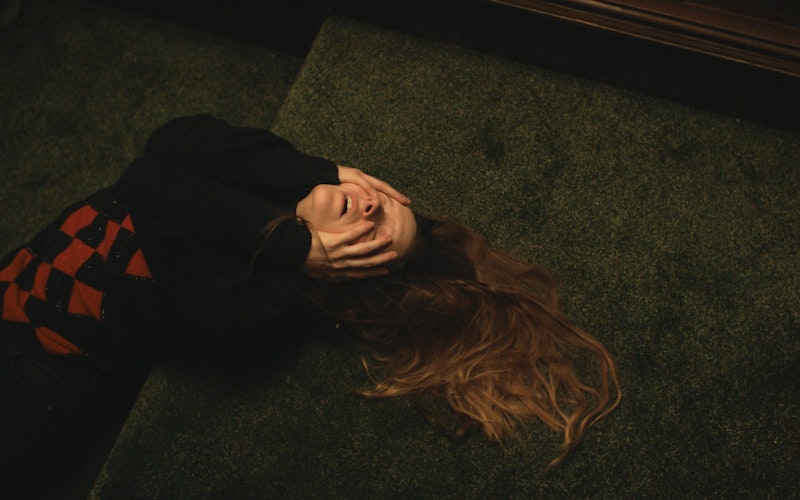
Movies
Saint Maud and Saving Souls
Perhaps the most frightening thing about the disturbed title character in Saint Maud, a new horror film available on demand Feb. 12, is that she prays as I do.
A pious, palliative-care nurse, Maud (Morfydd Clark) sometimes stills herself for dedicated prayer time, but she mostly has a running, stream-of-consciousness conversation going on with God in her head (which we hear via voiceover). Personal and matter of fact—“I’ve taken two ibuprofen” she mentions as an aside during one divine conversation—she regards God both as omnipotent being and quiet confidante.
I like to think this intimate, somewhat distracted way of talking to God is the only thing I share with Maud, however. As the movie—a strikingly confident feature debut from writer-director Rose Glass—proceeds, Maud’s saintliness comes into considerable question. Indeed, her piety transforms from an attribute to a threat.
When we first meet Maud, she’s praying in earnest for her latest client: Amanda (Jennifer Ehle). A former dancer, Amanda is now confined to a wheelchair in her hilltop mansion with a terminal case of lymphoma. During one of their morning exercises, Amanda notices the cross necklace dangling from Maud’s neck and asks her about it. As Amanda expresses continued curiosity about Maud’s faith, Maud comes to believe that her calling may not only be physical, but spiritual. And so she sets out to save Amanda’s soul.
I’ve always felt a tremendous weight with that phrase: “saving souls.” As a little kid, while handing out religious tracts to strangers as part of a youth conference, my mind reeled at the burden being put on my awkward interactions and those flimsy sheets of paper. (At the end of the day, the wad of leftover pamphlets in my hand seemed to represent a stack of one-way tickets to hell.) Sharing the good news is one thing—I like to think that’s what we do here at Think Christian—but saving souls? Even in the light of the Great Commission, it seems like claiming that ability might be overstepping our bounds.
Maud, however, is too fervent to simply share the good news, especially after she begins to experience visions in the wake of Amanda’s initial interest in spiritual matters. In one such vision, the lights in the mansion begin to throb as Maud makes her way up the stairs, moving in a trance-like way that resembles the dance videos she’s seen from Amanda’s early career. Later, there is a levitation sequence in which Maud rises in the midst of her tiny apartment, hovering like a suspended still life.
Sharing the good news is one thing, but saving souls?
Or does she? Glass’s filmmaking is sly enough to suggest that much, if not all, of this is taking place in Maud’s head. (Are the fireworks outside of Maud’s apartment during the levitation scene sent by God or part of some civic celebration?) As the tensions between the two women increase, especially once Amanda backtracks from her “conversion,” more questions arise: Is Amanda the recipient of Maud’s love or the victim of her religious obsession? Has Maud truly been “called” or is she suffering from mental illness?
Another question: What does Saint Maud mean for those of us who do feel compelled by the Great Commission? After all, those outside the faith sometimes consider evangelism to be a form of madness. In following in the footsteps of Jesus’ disciples, whom he called to “fish for people,” we clearly don’t want to be like Maud. So what distinguishes us from her?
It’s interesting to me that aside from some of her basic devotional habits, we learn little about Maud’s faith. If she was raised in the church, we have no hint of it. If she’s acting out of a zealous, recent conversion, those details are left vague. I think this disinterest in the nature of Maud’s faith is a fault of the film, which could be accused of exploiting both religion and mental illness for ghastly thrills.
At the same time, placing Maud in a spiritual vacuum reveals something instructive, at least as far as evangelism is concerned. Like most things in the Christian life, evangelism is best done in community, alongside fellow believers who share the task of spreading the good news while also relieving the pressure to “save souls.” As far as we know, Maud has no church; indeed, there isn’t another person of faith seen in the film. And so her spiritual direction comes only from the visions she imagines (as well as a book of drawings and poetry by the supernaturally attuned and church-averse William Blake, a gift from Amanda that helps send Maud off the deep end).
For all its tension and terror, Saint Maud is not without a sense of humor. During a detente in their spiritual battle, Amanda takes a raspy breath and tells Maud, “You got a little carried away didn’t you?” Rather than reading Blake, Maud could have benefited from J.I. Packard’s Evangelism and the Sovereignty of God, in which he writes, “. . . the way to tell whether in fact you are evangelizing is not to ask whether conversions are known to have resulted from your witness. It is to ask whether you are faithfully making known the gospel message.”
Getting carried away by the gospel is a good thing, of course; to “go and make disciples” is an urgent command. But believing that the fate of one person’s soul lies only in our hands—not God’s—is another thing altogether.
Topics: Movies